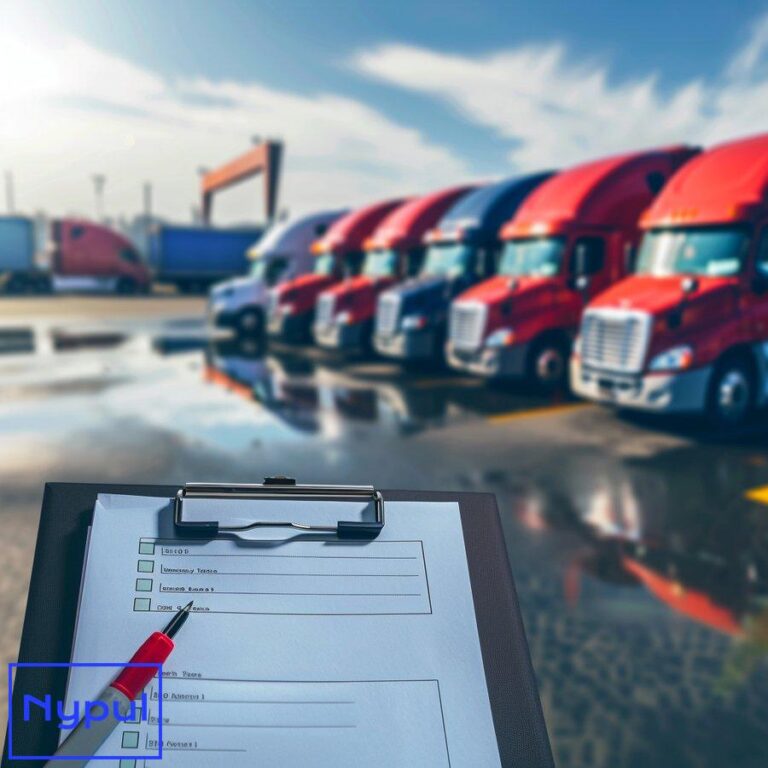Who Is Required to Use an Electronic Logging Device
What are electronic logging devices (ELDs) and why are they mandated?
Electronic Logging Devices (ELDs) are technology tools that record a commercial driver’s hours of service (HOS) automatically. They connect to a vehicle’s engine to monitor driving time, ensuring compliance with federal regulations set by the Federal Motor Carrier Safety Administration (FMCSA). The primary purpose of ELDs is to enhance road safety by preventing driver fatigue, which is a significant contributor to accidents.
The mandate for ELDs arose from the need to standardize HOS documentation, replacing paper logbooks that were often prone to inaccuracies and falsifications. ELDs provide real-time data on driving patterns, allowing for better fleet management and improved accountability. The FMCSA established these regulations to ensure that drivers adhere to safe driving limits, thus promoting safer highways for all users.

Key Features of ELDs
-
Automatic Recording: ELDs automatically record driving time, engine hours, vehicle movement, and location information.
-
User-Friendly Interfaces: Many ELDs come with intuitive interfaces that simplify data entry and retrieval for drivers.
-
Data Transfer Capabilities: ELDs can transfer data electronically to law enforcement and safety officials during inspections, reducing the need for paper documentation.
Importance of ELD Mandates
The implementation of ELDs has several benefits:
-
Safety Improvement: By monitoring driving hours, ELDs help reduce fatigue-related accidents.
-
Enhanced Compliance: They facilitate adherence to HOS regulations, minimizing violations.
-
Operational Efficiency: Fleet managers can analyze driving patterns and optimize routes based on real-time data.
Who must comply with ELD regulations?
Compliance with ELD regulations is required for specific groups within the trucking industry. The FMCSA outlines clear criteria regarding who must use these devices.

Required Users
-
Commercial Drivers: Drivers who operate vehicles that require a commercial driver’s license (CDL) and who are subject to HOS regulations must use ELDs. This includes those who drive vehicles weighing over 10,000 pounds or transport hazardous materials.
-
Motor Carriers: Companies that employ commercial drivers must ensure their vehicles are equipped with compliant ELDs.
Exemptions from Compliance
While many drivers are required to use ELDs, certain exceptions exist:
-
Short-Haul Drivers: Drivers who operate within a 150 air-mile radius and do not exceed 14 hours of on-duty time are exempt from using ELDs.
-
Driveaway-towaway Operations: Drivers transporting a vehicle that is part of a shipment (like tow trucks) may not need an ELD if they meet specific criteria.
Understanding who is required to comply helps ensure that all parties involved in freight transport adhere to safety standards and regulations.
Which drivers and vehicles are exempt from ELD requirements?

While many drivers must comply with ELD mandates, several categories of exemptions exist. Recognizing these exemptions is crucial for both drivers and fleet operators.
Categories of Exemptions
-
Drivers using Paper Logs: Drivers who have operated under paper logs for at least the past eight days prior to the current day may continue using paper logs instead of transitioning to an ELD.
-
Vehicles manufactured before 2000: Trucks built before the year 2000 are not required to have an ELD since they do not have electronic systems compatible with such devices.
-
Drivers operating under specific HOS exceptions: Certain agricultural operations or emergency response situations may exempt drivers from using ELDs if they meet specific criteria set by the FMCSA.
Summary Table of Exemptions
| Exemption Category | Description |
|---|---|
| Short-Haul Drivers | Operate within a 150 air-mile radius; do not exceed 14 hours on duty. |
| Driveaway-Towaway Operations | Transporting vehicles as part of a shipment; specific criteria apply. |
| Paper Log Users | Have used paper logs for at least eight consecutive days prior. |
| Older Vehicles | Vehicles manufactured before 2000; lack compatible electronic systems. |
| Specific HOS Exceptions | Agricultural operations or emergency responders under certain conditions. |
Understanding these exemptions helps drivers and fleet operators navigate compliance effectively while ensuring safety remains a priority.
How do ELD mandates apply to special operations?
Special operations in the trucking industry often face unique challenges regarding compliance with ELD mandates. Recognizing how these mandates apply can help operators maintain adherence while managing their specific operational needs.
Types of Special Operations
-
Agricultural Transport: Drivers transporting agricultural products may have different HOS rules and may be exempt from using ELDs during certain periods of the year or under specific conditions.
-
Emergency Response: First responders and emergency personnel may also be exempt from using ELDs when responding to emergencies or during disaster relief efforts.
Compliance Considerations
Operators engaged in special operations should consider the following:
-
Review Specific Regulations: It’s essential for operators to familiarize themselves with both federal and state regulations regarding their special operations.
-
Document Exemptions Properly: Ensure that all exemptions are well-documented in case of inspections or audits by regulatory authorities.
Summary Table of Special Operations Considerations
| Operation Type | Compliance Requirement | Notes |
|---|---|---|
| Agricultural Transport | May be exempt during specific periods | Check local regulations |
| Emergency Response | Often exempt during active response | Documentation is crucial |
| Other Special Cases | Review applicable federal/state regulations | Ensure proper documentation |
By understanding how ELD mandates apply specifically to special operations, operators can ensure compliance while effectively managing their unique circumstances.
When are the compliance deadlines for different groups?
The FMCSA has established various compliance deadlines for different groups regarding the implementation of ELDs. Understanding these timelines is critical for ensuring adherence to regulations.
Key Compliance Dates
-
Initial Compliance Date (December 18, 2017): This date marked the requirement for most commercial drivers operating under HOS rules to transition from paper logs to electronic logging devices.
-
Phased Implementation Dates:
-
Exemptions Deadline (December 16, 2019): Drivers who were previously using paper logs had until this date to ensure compliance with new regulations.
-
Final Compliance Date (June 2021): This date marked the final deadline for all remaining exemptions or extensions granted by the FMCSA, requiring full compliance across all eligible drivers and vehicles.
Summary Table of Compliance Deadlines
| Group/Category | Initial Deadline | Final Deadline |
|---|---|---|
| Most Commercial Drivers | December 18, 2017 | June 2021 |
| Exemptions/Extensions | December 16, 2019 | June 2021 |
Being aware of these deadlines allows fleet operators and drivers to plan accordingly and avoid potential penalties associated with non-compliance.
What are the consequences of non-compliance with ELD regulations?
Failing to comply with ELD regulations can lead to significant consequences for both drivers and motor carriers. Understanding these repercussions emphasizes the importance of adhering to established guidelines.
Potential Consequences
-
Fines and Penalties: Non-compliance can result in hefty fines imposed by regulatory agencies. The FMCSA has set specific penalties based on violations related to HOS rules and improper logging practices.
-
Increased Inspections: Non-compliant carriers may face heightened scrutiny during roadside inspections, leading to further delays and potential legal issues.
-
Impact on Safety Ratings: Non-compliance can negatively affect a carrier’s safety rating within the FMCSA’s Compliance Safety Accountability (CSA) program, which could hinder future business opportunities or contracts.
Summary Table of Consequences
| Consequence | Description |
|---|---|
| Fines and Penalties | Financial penalties imposed for violations |
| Increased Inspections | More frequent inspections leading to operational delays |
| Negative Safety Ratings | Deterioration in CSA ratings impacting business prospects |
Awareness of these consequences reinforces the importance of compliance with ELD mandates among drivers and motor carriers alike.
How do I choose an FMCSA-registered ELD for my operation?
![]()
Selecting an appropriate Electronic Logging Device (ELD) is crucial for ensuring compliance while enhancing operational efficiency. With numerous options available in the market, understanding how to choose an FMCSA-registered device can streamline this process.
Key Considerations When Choosing an ELD
-
FMCSA Registration: Ensure that any device you consider is registered with the FMCSA. This guarantees that it meets federal standards for functionality and reliability.
-
User-Friendly Interface: Look for devices that offer intuitive interfaces for both drivers and fleet managers. Ease of use can significantly impact daily operations.
-
Data Transfer Capabilities: Choose an ELD that allows seamless data transfer during inspections or audits. This feature can save time and reduce stress during regulatory checks.
-
Customer Support Services: Opt for providers that offer robust customer support services. Having access to assistance when needed can enhance operational efficiency.
-
Integration Options: Consider whether the device integrates well with existing fleet management software or other tools used in your operation. Compatibility can streamline processes further.
-
Cost Considerations: Evaluate both upfront costs and ongoing subscription fees associated with using an ELD system. Balancing quality with budget constraints is essential.
-
Reviews and Recommendations: Research user reviews or seek recommendations from industry peers about their experiences with various devices. Real-world feedback can provide valuable insights into performance reliability.
Summary Table of Key Considerations
| Consideration | Description |
|---|---|
| FMCSA Registration | Verify registration status with FMCSA |
| User-Friendly Interface | Look for intuitive design |
| Data Transfer Capabilities | Ensure ease of data transfer during inspections |
| Customer Support Services | Access reliable support when needed |
| Integration Options | Compatibility with existing systems |
| Cost Considerations | Balance quality against budget constraints |
| Reviews and Recommendations | Gather feedback from users in the industry |
Choosing an appropriate FMCSA-registered ELD requires careful consideration of various factors tailored specifically to your operation’s needs while ensuring compliance with federal regulations effectively.
This comprehensive overview provides critical insights into electronic logging devices (ELDs), their mandates, exemptions, application in special operations, compliance deadlines, consequences of non-compliance, and guidance on selecting suitable devices tailored specifically for your operational needs within the trucking industry.






